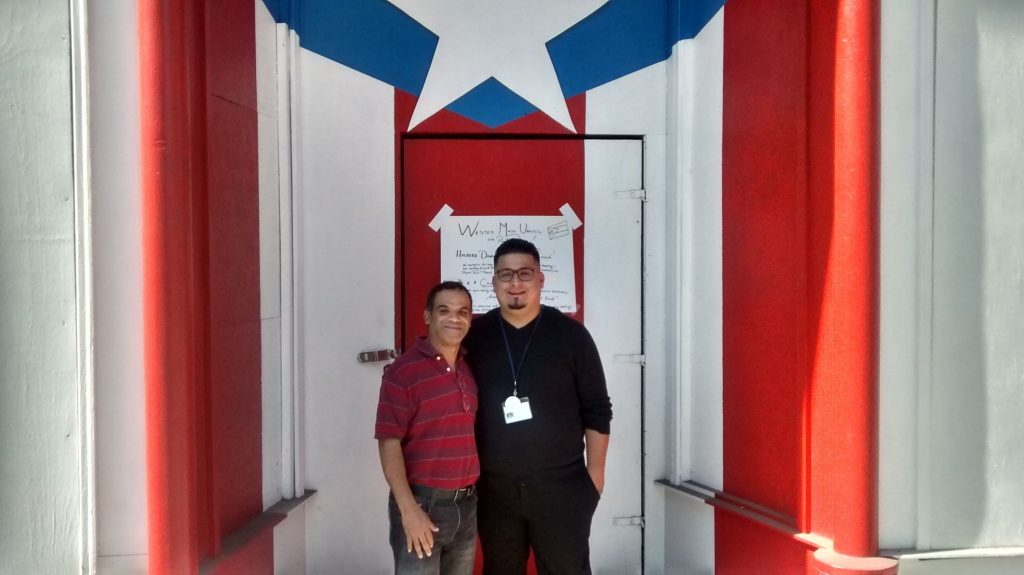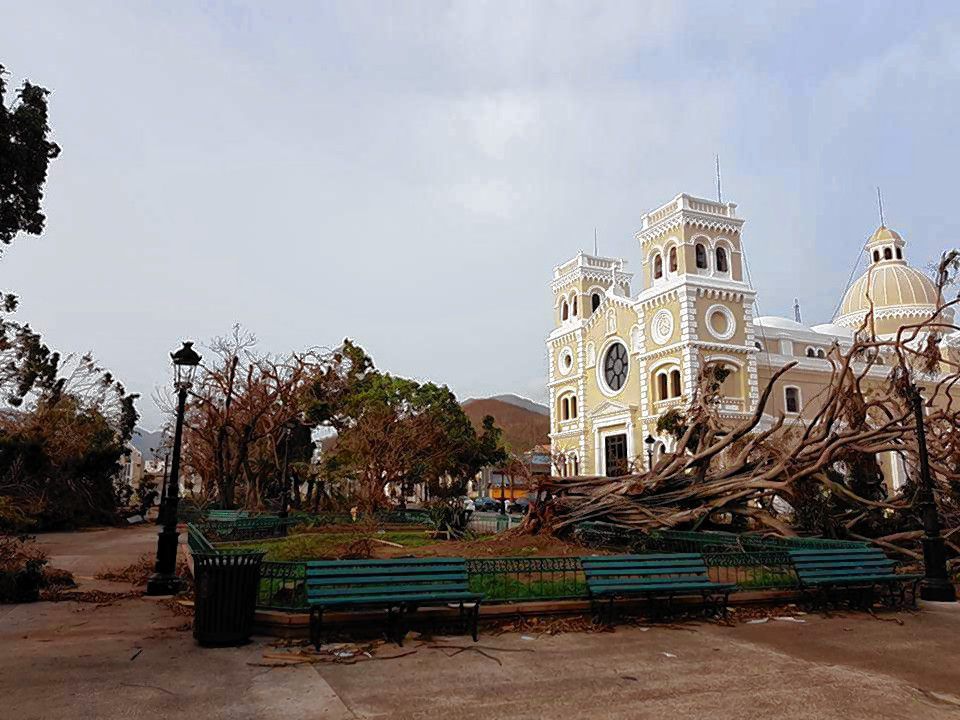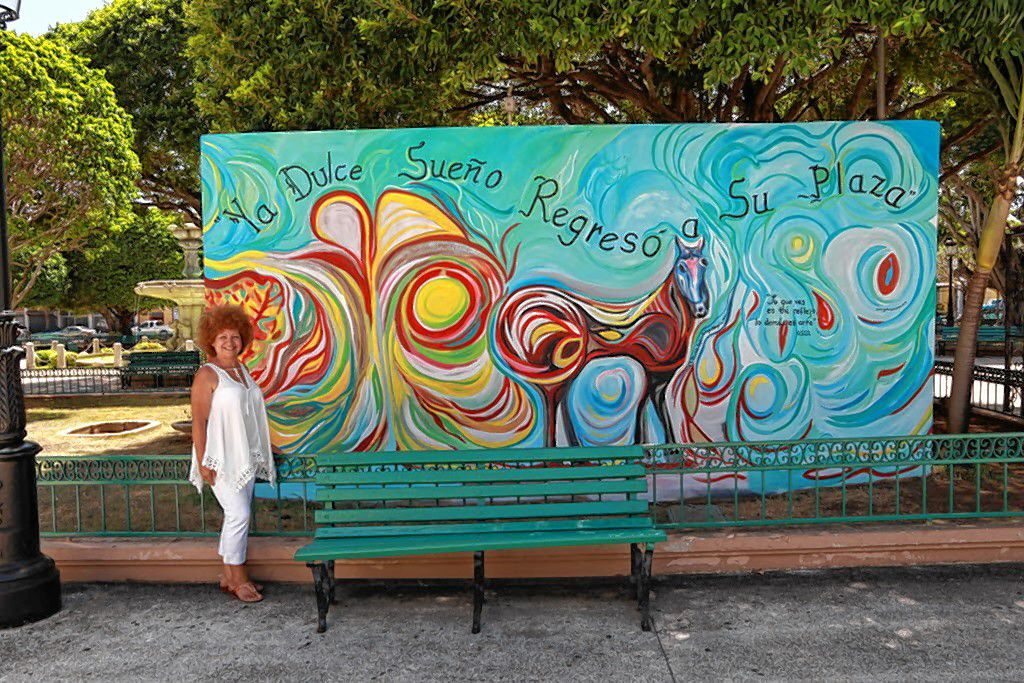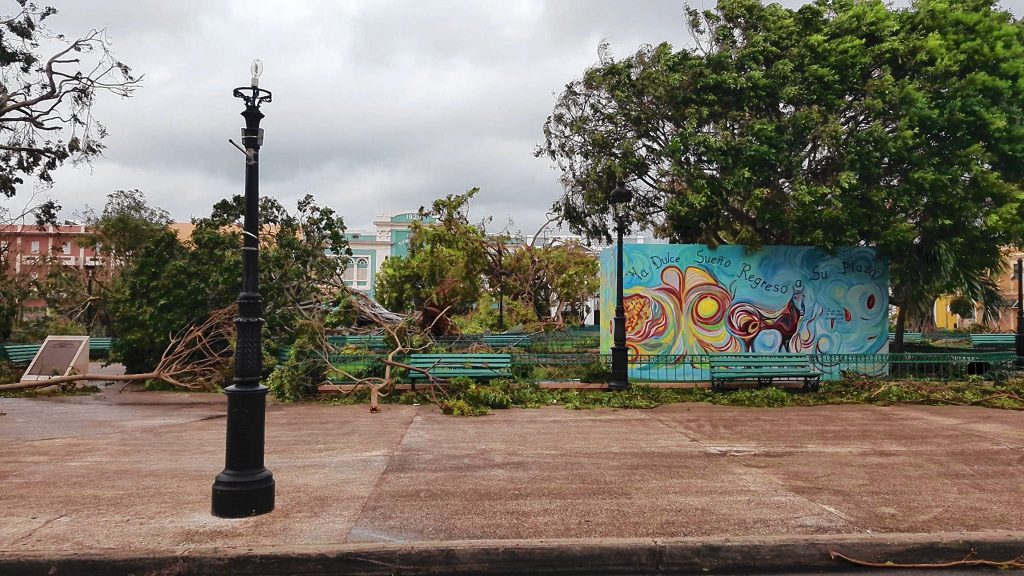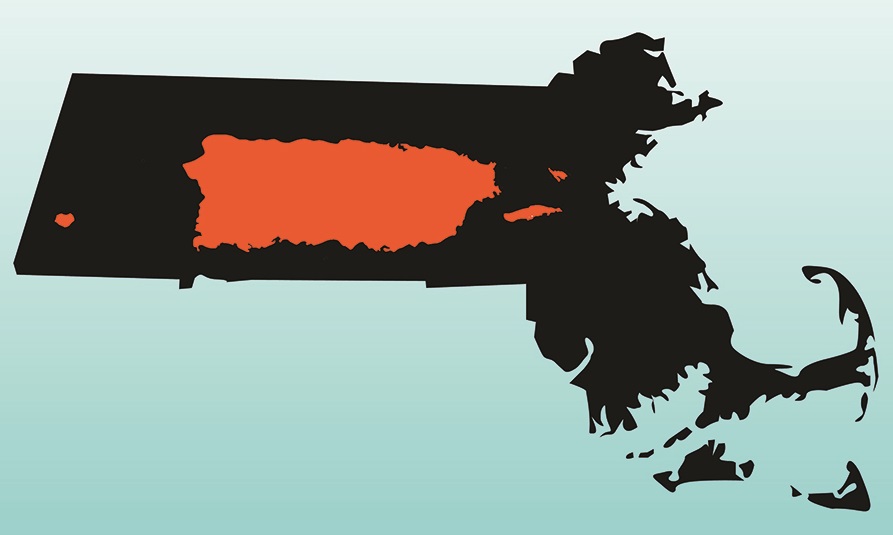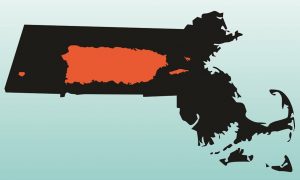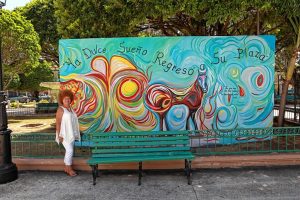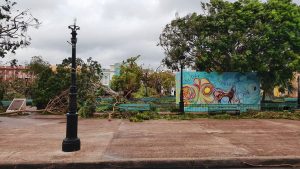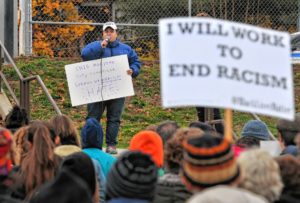These weren’t the circumstances in which Holyoke resident Israel Rivera had imagined he would be meeting his nieces — ages 13 and 17 — for the first time.
Rivera, who is of Puerto Rican descent, recently agreed to house his sister’s children after his sister Amarilis De Léom and her family endured devastation from Hurricane Maria on the island. They arrived on a flight to Teterboro, N.J., on Wednesday, Oct. 4. The trip down and back took Rivera seven hours, but New Jersey was the closest they could get.
Now the pair will live with Rivera and his mother in Holyoke. Their plans beyond the short term are uncertain.
“I think it may be permanent, but I don’t know honestly,” said Rivera, who is community engagement director for OneHolyoke, a nonprofit that offers housing assistance for low-income residents. “Their mother should be on her way in about a month or so. We’re going to see how this works.”
Rivera’s family represents an early trickle of what could prove a cascade of Puerto Ricans fleeing the island for Western Massachusetts.
It’s been more than two weeks since Hurricane Maria left a trail of devastation in Puerto Rico, leaving 95 percent of its 3.4 million people without power. Food and drinkable water have become more scarce, and many people are fighting just to survive.
Puerto Rico is an American protectorate, meaning that Puerto Ricans are American citizens and are free to resettle in any part of the country. Non-profit organizers, school officials, city leaders, and activists in Holyoke, Springfield, and the surrounding communities are preparing for many to move to the Pioneer Valley.
Both Holyoke and Springfield already have large Puerto Rican communities with ties to many family members living on the island. The U.S. Census Bureau categorized about half of Holyoke’s 40,000-person population as being of Puerto Rican descent. Civic leaders estimate that there could be dozens, if not hundreds, of families who plan to relocate to Western Massachusetts.
“There really isn’t a very good scientific method, particularly with the difficulties of communication and logistics on the island, of understanding if we’re talking about five families, 50 families, or 500,” said Marcos Marrero, director of planning and economic development in Holyoke. “Hopefully we can approximate the order of magnitude. We don’t expect a torrential flow in the next week or two. There’s a bottleneck at the airport. There’s still radar issues down there. Over time, what we do expect is the migration pattern, which was already in place before Maria, will increase.”
For Rivera, getting to pick up his nieces and knowing that they are safe made him happy — the fact that they were able to board the plane was uncertain until they were sitting inside, he said. But he added that much uncertainty remains about what will happen next.
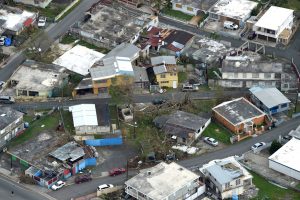
Civil Air Patrol in cooperation with the Air National Guard does an ariel survey over northern Puerto Rico Sept. 26, 2017 after hurricane Maria impacted the island on Sept. 20, 2017. The Civil Air Patrol is part of the Air Force’s total force concept. (U.S. Air Force photo by Airman 1st Class Nicholas Dutton)
“Right now I’m having them take a language exam in the public schools and then I should be meeting with the principal tomorrow at Holyoke High and maybe, hopefully, if everything goes right, they’ll be at school on Monday,” he said.
His sister is still living in Humacao on the eastern coast of Puerto Rico and the earliest flight that Rivera could find for her was on Nov. 6 for $194. He had been searching for tickets since Oct. 1, calling different airlines, which were charging outrageous prices. He hung up on two airlines who wanted $800 and $1,200, respectively, for plane tickets.
On the phone with a third airline, he said, “I don’t understand how you guys feel when people are dying and trying to leave the island and you’re just going to ramp up the prices so no one can buy it. These people literally have to sit there and starve.”
The only reason his nieces were able to board a plane was due to City Councilor Nelson Roman telling him about someone who was booking a charter flight out of Puerto Rico, free of charge, on a private jet, he said. The flight carried them here.
He wants his sister to be able to get out as soon as possible. With food, water and other resources scarce, being in Puerto Rico is dangerous, he said.
“My sister told me that somebody the other day killed another person for a gas tank,” he said.
Holyoke Preparations
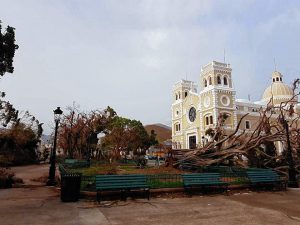 To address the expected influx of Puerto Rican people and plan how to take care of their needs, including housing, Holyoke Mayor Alex Morse organized a meeting on Sept. 28. At least 35 non-profit organizations, including OneHolyoke, the Holyoke Health Center, Enlace de Familias, and the Valley Opportunity Council, participated. Marrero is spearheading the initiative.
To address the expected influx of Puerto Rican people and plan how to take care of their needs, including housing, Holyoke Mayor Alex Morse organized a meeting on Sept. 28. At least 35 non-profit organizations, including OneHolyoke, the Holyoke Health Center, Enlace de Familias, and the Valley Opportunity Council, participated. Marrero is spearheading the initiative.
“There isn’t a specific program only for folks who are coming up from Puerto Rico,” Marrero said. “It’s taking the programs that are in existence now and seeing how we need to ramp them up and expand them. There are some foundations that are looking at this as well and have already been in contact with us.”
Among them is the Massachusetts United for Puerto Rico Fund, which was announced on Sept. 29 and is a partnership with the Latino Legacy Fund and civic leaders of Boston’s Puerto Rican community. The organization is dedicated to providing relief and reconstruction funds for Puerto Rico and any citizens of the island arriving in the commonwealth.
“Part of their fundraising efforts could go to helping families that decide to self-evacuate to Massachusetts or relocate here,” Marrero said. “As we identify what our needs are here, there are already foundations that have reached out to us and said, ‘Let us know how we can help.’”
Marrero said Holyoke Public Schools has begun documenting the number of Puerto Rican students entering the school system in order to find out how many people are relocating to Holyoke.
Judy Taylor, director of communications for Holyoke Public Schools, said 80 percent of current students in Holyoke are of Puerto Rican descent.
“No new students have arrived yet, but we anticipate that some Holyoke families may open their homes to relatives and friends, given the extent of what has happened on the island,” she said. “We have reached out to families in Holyoke requesting they notify the district if they are aware of any students who will be arriving.
She said the district is planning on new students from Puerto Rico arriving towards the middle or end of October.
Taylor said the district has trained counselors and it recently launched Newcomers Academy at Holyoke High School, which supports eligible students with limited English proficiency. That would be one of the main resources to help Puerto Rican students integrate into the school system.
“Most of the families who arrive will be homeless,” she said. “We are working with community leaders and relief agencies to have a coordinated plan to enroll students as quickly as possible and connect families with resources they will need.”
A Harrowing Escape
Even though a wave of Puerto Ricans is expected eventually, many believe they are likely to come in a trickle because of the continued difficulty getting off of the island.
Alvilda Sophia Anaya Alegría of Springfield, who happened to be visiting Puerto Rico on a work trip when the hurricane struck, said she was lucky to get off the island at all. She spent three days standing in line at an airport for eight to 10 hours a day with 2,500 other people. Only 300 of them were able to get on a plane during that time.
“There was no electricity, so you couldn’t call JetBlue or any other airline from your home,” she said. “What I decided to do was to go to the airport, thinking, ‘Well, they’ll have people at the counter who will be able to give you a ticket.’ That was not the case at all.’”
Alegría, who is a fine arts and economics professor at Cambridge College at Tower Square in Springfield, found the counter closed and the airport filled with water up to people’s knees. The only way to buy a ticket was to use one of six phones the airline had set up, but even getting to buy a ticket didn’t guarantee space on a flight.
The minute you’d hang up after booking your flight, it would be canceled, she said.
“My ticket was cancelled five times and you just had to get in line again and remind them that you were in line the day before and that you just needed to get another date to get out,” Alegría said.
Groups stayed at the airport from 5 a.m. to 6 p.m., before being asked to leave the building due to a curfew. She and others slept for three nights in a tunnel with water up to her knees. The tunnel was located in an area outside the airport that wasn’t being used anymore.
“We were taking turns watching over each other; making sure people had food,” she said.
Alegría said one of the most devastating experiences for her was seeing her hometown of Guayama, Puerto Rico, practically in ruins.
“It destroyed the whole center of the town. All the trees and everything is gone from the center of my hometown of Guayama,” she said. “It’s quite devastating to see how one day you’re there and then the next day you’re not. Sometimes we take for granted that things are going to last forever. All I was thinking was, ‘Oh my God, this uprooted every tree, every neighborhood around me, and how can you even reestablish it?’”
As for those left on the island, many of the most vulnerable are struggling for survival. She continues to read stories from her Facebook friends who live in Puerto Rico with urgent messages requesting a generator for an oxygen pump or ice to keep insulin medication in cold storage.
“We don’t think about those little details,” Alegría said. “We don’t think about someone sitting at home and thinking, ‘What am I going to do with my insulin? I have four more needles full of insulin.’”
Choosing Western Mass
Springfield City Councilor Adam Gomez attended a meeting with Mayor Domenic Sarno, City Council President Orlando Ramos, and city department heads to determine Springfield’s response to the crisis in Puerto Rico.
Most of the efforts have been centered around sending aid, but there have also been discussions about preparing for incoming families, he said. Gomez expects that many families will be unable to produce documentation normally required for housing and schools, and the city is creating a waiver system to help them, he said.
“We won’t be waiting for records to become available,” he said. “If children come, they will be auto-enrolled in school. We can make sure they are in a safe environment.”
Gomez said the city would be working with Congressman Richard Neal’s office to work on getting their information and documentation.
As far as who is here for a short time and who for a long time, Gomez isn’t certain. But he does expect Western Massachusetts to be among the places that many Puerto Ricans choose to come while fleeing the devastation from the storm.
“This has been a place where all people of all classes and all races have been welcome,” he said. “The Pioneer Valley is a melting pot for people of all places and Puerto Ricans have lived in Massachusetts for more than 60 years,” he said.
Gomez himself has family members who are coming to the area from Puerto Rico, including in-laws and cousins. Even before the back-to-back hurricanes devastated the island, Puerto Rico’s debt crisis meant that people on the island were already looking to come to the states for employment, he said.
David Silva, of Chicopee, heads the Puerto Rican Culture Center, which serves people in Springfield, Holyoke, and the surrounding communities. He said he expects people to come, but also said many may choose to stay depending on how much relief from the government is available.
Silva’s family members on the island are mostly committed to staying. Most have jobs they are reluctant to leave, he said.
Where Puerto Ricans choose to go is an open question. Large populations of Puerto Ricans exist in New York, Florida, and Texas, and new communities are building in some unexpected places like Pennsylvania, he said.
At the same time, Silva said the Springfield and Hartford areas would be attractive to Puerto Ricans because of good health care, good employment opportunities, and a strong established Puerto Rican community.
“If you look at Florida and places down south, they are not good,” he said. “Folks go there because of the weather, but once there they realize that health care is not as good as it is up in the Northeast.”
Housing and educational facilities are the resources that will be most needed, he said, and added that non-profit organizations and churches would likely be stepping in to offer what support they can, especially if governmental agencies become overwhelmed.
Arise for Social Justice, based in Springfield, is one such group. Michaelann Bewsee, director of the organization, said she is expecting the people who come to Arise to be homeless.
“They stay with a relative for a while, but the relative is in public housing and they are only allowed to have guests for two weeks maximum,” she said.
Bewsee said she fears that the state is unprepared for the people coming in. Already, the state Department of Housing and Community Development only deems 30 percent of the families that come with them eligible for housing.
“I can’t begin to tell you the chaos in people’s lives around homelessness, but now we expect to see that greatly increased,” she said.
Florida and Texas, which might have been good options to travel to for Puerto Ricans, are in trouble because of their own recent experiences with hurricanes, making Western Massachusetts more likely as a destination.
While those who are leaving the island face challenges in getting on their feet, Bewsee hopes many will stay in the area.
“The Puerto Rican community is an incredibly vibrant and rich and contributes so much to Springfield already, in spite of the incredible racism people face in this community,” she said. “They will be assets, not liabilities.”
A Lack of Funds
Enlace de Familias, a grassroots resource nonprofit that specializes in providing food, housing, and public school system referrals, will serve as a first access point for Puerto Rican families arriving to Holyoke. The non-profit would likely see support from the city and other groups, Marrero said.
Betty Medina Lichtenstein, executive director of Enlace de Familias, said Massachusetts is in a bind to support Puerto Rican people relocating to the commonwealth due to a lack of funding.
“The last thing that one would want to do is to put victims of a hurricane in emergency shelters,” Medina Lichtenstein said. “Anyways, there aren’t enough beds in the state funded emergency shelters to be able to accommodate a large number of people that might be coming.”
The added difficulty in Holyoke is a lack of available low-income housing, she said.
City Councilor Jossie Valentin said the group of nonprofits working with the city have had conversations with state officials about relaxing some of the requirements faced by those living in low-income housing. For instance, family members putting up relatives in their affordable housing units risk losing their apartments if they become overcrowded, she said.
Valentin and her wife Myriam Quinones have trained as Red Cross emergency responders and they plan to be part of a disaster relief team in Puerto Rico for three weeks starting in early November. They had to take three weeks of vacation time from their jobs at Holyoke Community College in order to serve as responders.
The training entails learning how to work at Red Cross shelters, understanding more about food safety, and how to provide mental health support to hurricane survivors, said Valentin, who has a background in mental health.
“After the devastation of Irma and Maria, it’s obvious that the need is there. We’re now two weeks into the devastation of Maria and many of the 78 cities and towns on the island are still not receiving the help and the resources that they need,” she said
For Valentin, helping the people of Puerto Rico recover is personal. She has family in San Juan, Puerto Rico and said she grew up on the island from the ages of 7 to 17.
“Puerto Rico is my home and I feel that if there is something that I can do, then why not?” she said.
Her father is 81 years old and has diabetes, so she made sure to buy him a one-way ticket to live with her brother in Florida. Her father isn’t sure if he would live there permanently or return to Puerto Rico once the island’s infrastructure is improved.
“There are towns on the island that right now the estimate is that they might be without electricity for four to six months,” she said. “When you think about children and when you think about seniors and folks with medical concerns, that is not a realistic time frame.”
Valentin said another idea to increase the availability of affordable housing to those fleeing Puerto Rico would be fast-tracking their housing requests.
Medina Lichtenstein said it’s anticipated that people relocating from Puerto Rico would arrive in the city with specific needs. The first arrivals will likely be people who need medical attention for illnesses such as diabetes as well as relatives of city residents, especially children and elderly family members, she said.
The Federal Emergency Management Agency (FEMA) is providing some relief to homeowners who lost their property in the storm through its Individuals and Households financial help program, but it is limited to $33,000 per person, according to FEMA.
Homeowners are required to explain to FEMA what their home looked like prior to the storm and provide documents, which may prove challenging for those who lost records during the storm.
“If I was a homeowner in Puerto Rico I would not leave my property. I would be staying there,” Medina Lichtenstein said, adding that homeowners risk losing their land and not being compensated by FEMA if they leave.
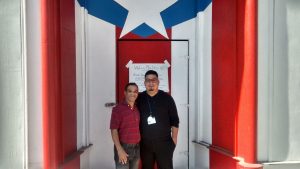 “My grandfather’s being stubborn and saying he doesn’t want to go because he doesn’t want to leave his house,” Holyoke City Councilor Nelson Roman said, adding that many island residents share the 76-year-old’s reluctance.
“My grandfather’s being stubborn and saying he doesn’t want to go because he doesn’t want to leave his house,” Holyoke City Councilor Nelson Roman said, adding that many island residents share the 76-year-old’s reluctance.
Roman is the executive director of Nueva Esperanza on Main Street in Holyoke. The nonprofit started collecting donations before Hurricane Maria struck. A total of 228 boxes consisting of nonperishable food, clothing, and other amenities will be on a flight to Puerto Rico, but likely won’t be in the hands of the people who need these goods for weeks, if not months.
As he and others prepare communities in Western Massachusetts for incoming Puerto Ricans, his frustration is mounting over government mishandling of the relief effort on the island.
He said he expected the boxes they collected to be sitting in the port because of the challenges of transporting them on heavily damaged roads and other infrastructure. On top of that, there’s the added complication of having to become authorized to send goods through a cumbersome governmental process.
“They fucked up,” he said. “It’s all this massive red tape and we felt it.”
Chris Goudreau can be reached at cgoudreau@valleyadvocate.com. Dave Eisenstadter can be reached at deisen@valleyadvocate.com.

